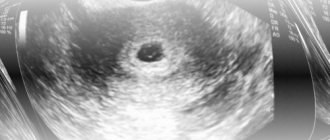During pregnancy, the female body changes dramatically, which is especially noticeable when analyzing hormonal components. Hormonal changes during pregnancy are completely normal, unless there are any disruptions. Sometimes a deficiency of progesterone, which is called the pregnancy hormone, is diagnosed: its insufficient synthesis often causes miscarriages in the early stages and premature births in the third trimester. It is to avoid such incidents that Utrozhestan is prescribed.
Characteristics of the drug
The active substance of Utrozhestan is natural progesterone, which is necessary for the normal course of pregnancy. The preparation contains it in an improved form to facilitate absorption.
Utrozhestan belongs to the group of gestagenic agents, and gestagen is another name for progesterone.
It is difficult to overestimate the importance of the hormone during pregnancy. It changes the structure of the uterine endometrium to facilitate the introduction of a fertilized egg into it, reduces the contractility of the uterus, preventing hypertonicity of the organ and termination of pregnancy. Progesterone is also involved in preparing the mammary glands for breastfeeding, stimulating lactation.
The drug is absorbed from the vagina and gastrointestinal tract. It all depends on the method of use, which is determined by the doctor: oral or vaginal administration of capsules. However, when using capsules intravaginally, the local effect is more pronounced and the desired effect is achieved faster, and taking capsules orally during pregnancy is prohibited.
Capsules are small light yellow elastic tablets based on gelatin, round or oval in shape. The average daily dose of the drug (100 ml) helps maintain optimal levels of the sex hormone, ensuring the normal course of pregnancy.
In what cases is Utrozhestan prescribed during pregnancy?
Utrozhestan during pregnancy is prescribed to women who are diagnosed with:
- Threat of spontaneous abortion (miscarriage);
- Low levels of progesterone in the blood.
If there is a history of miscarriages, the medication may be prescribed for preventive purposes. If there is a threat of interruption, the drug is used on an emergency basis.
Utrozhestan is also prescribed to expectant mothers who are at risk for the following reasons:
- There have been miscarriages in the past.
- Pregnancy complications arose due to a lack of progesterone.
- The pregnancy resulted from IVF or the procedure was performed in previous pregnancies.
- Infertility was diagnosed due to disruption of the second phase of the menstrual cycle.
- The woman was taking Utrozhestan or its analogues at the time of conception.
- Previous pregnancies were accompanied by premature birth.
- Shortening of the cervix was diagnosed.
In some cases, taking Utrozhestan is indicated for other reasons.
Contraindications
The reasons to refuse to take Utrozhestan are the following problems:
- the woman has a tendency to blood clots, thrombophlebitis or thromboembolic pathologies have been detected (including in the past);
- vaginal bleeding has been detected, but its cause has not yet been established;
- an incomplete abortion occurred;
- there is a suspicion of tumors of the genital organs, mammary glands, or a malignant neoplasm has already been diagnosed;
- the patient developed porphyria;
- the woman’s liver is damaged due to hepatitis or other serious illness;
- hypersensitivity to progesterone or any inactive ingredient of the capsules has been identified.
In addition to these contraindications, there are also many diseases and pathological conditions for which capsules are used with caution. These include diabetes mellitus, heart disease, bronchial asthma, epilepsy, kidney failure, high blood pressure and many other ailments
Can Utrozhestan be taken during pregnancy?
- in the 1st trimester
In the initial stages, taking Utrozhestan is not only allowed, but is often recommended. Capsules are inserted into the vagina every day at the same time: with this method of use there is no harmful effect on the digestive tract and liver. In addition, toxicosis may prevent oral administration of the capsules.
Functions of the drug in the first trimester:
- Elimination of uterine hypertonicity and prevention of this condition;
- Stabilization of the nervous system;
- Prevention of abortion;
- Replenishment of progesterone deficiency.
The negative effect of the drug on the fetus is practically excluded. In rare cases, it is possible to develop hypospadias, an abnormality of the urethra.
- in the 2nd trimester
In the second trimester, the drug is often not required. The main indication is a lack of progesterone, as well as:
- Cervical insufficiency;
- Pregnancy as a result of IVF;
- Shortening of the uterus.
In some cases, the medical history is studied, and if it contains miscarriages, surgical manipulations on the uterus, premature birth, the drug is extended indefinitely.
- in the 3rd trimester
After the 30th week of pregnancy, Utrozhestan is prescribed for certain indications:
- Premature softening of the birth canal;
- Shortening of the cervix;
- The baby is positioned too low.
Taking medication in late pregnancy is advisable only in special cases when the risk of premature birth is too high. The fact is that taking progestin drugs has a negative impact on the condition of the liver, and can also be dangerous in case of thrombosis.
It is important to understand that the admissibility of using Utrozhestan is considered individually in each case.
Instructions for use of Utrozhestan during pregnancy
— dosage
The therapeutic course is determined by the doctor, who analyzes the characteristics of the course of pregnancy, studies the severity of progesterone deficiency and prescribes a method of application.
If the choice is made in favor of oral administration of capsules, the daily dose varies between 200-300 ml during the day. As a rule, 100 ml is taken in the morning, the rest before bed.
For preventive purposes, when there is a threat of premature birth, the drug is used according to a certain scheme:
- 400 ml every 7-8 hours until the condition stabilizes;
- 200 ml at the same interval until the 36th week of pregnancy.
More on the topic
Utrozhestan when planning pregnancy
Lack of progesterone during early pregnancy
Duphaston in early pregnancy
Is it possible to take Festal during early and late pregnancy?
Duphaston for threatened miscarriage
For intravaginal administration, a dosage of 200 ml is provided daily. In difficult situations, the amount can be doubled.
If there is a threat of premature birth, the medication is used daily in an amount of 200 ml in the period from the 22nd to the 36th week.
If there is a threat of miscarriage in the early stages, the drug is taken every day at the same time in the morning and evening (with an interval of 12 hours) in a dosage of 200 or 400 ml until the 12th week of gestation.
- contraindications
Contraindications to taking the drug are:
- Varicose veins;
- Thrombophlebitis and thrombosis;
- Serious liver pathologies;
- Porphyria;
- Neoplasia of the genitals or mammary glands;
- Undiagnosed bleeding.
In some conditions, Utrozhestan should be used with extreme caution or may be contraindicated: we are talking about so-called relative contraindications. These are controversial situations when the doctor assesses the risks of taking the drug and pregnancy complications (threat of miscarriage, premature birth, lack of progesterone).
Such situations arise when:
- Stable increase in blood pressure;
- Epileptic seizures;
- Bronchial asthma;
- Diabetes mellitus;
- Mastopathy;
- Migraine;
- Impaired kidney function;
- Diseases of the cardiovascular system;
- Lupus erythematosus;
- Benign formations.
- side effects
Side effects from taking the drug are rare, however they can be:
- Amenorrhea;
- Mammalgia;
- Bleeding from the birth canal;
- Headaches and dizziness;
- Drowsiness, apathy, depression;
- Absent-mindedness;
- Nausea and vomiting;
- Stool disorders (diarrhea and constipation);
- Itching, peeling of the skin, rashes;
- Yellowness of the skin, chloasma.
Vaginal use of capsules may cause a local reaction: itching, burning, swelling.
Other negative reactions to the drug include blurred vision, blood clots, venous insufficiency, severe headaches, lack of sexual desire, weight gain or loss, thromboembolism, swelling, hirsutism, localized alopecia and anaphylactic shock.
But the appearance of yellowish oily discharge in moderate quantities after intravaginal administration of the drug is a variation of the norm.
- how to cancel
Since Utrozhestan is a hormonal drug, discontinuation should occur gradually. The most successful method of discontinuation of treatment and prevention is to reduce the dosage to 100 ml weekly or 50 ml every three days.
During gradual withdrawal of the drug, the woman should be constantly monitored by a doctor so that if bleeding begins, appropriate measures can be taken.
Side effects
Most often, the prescription of an effective drug is necessary during pregnancy to increase progesterone in the body. Due to the fact that the drug is natural progesterone, it is not capable of causing serious side effects. Usually ailments are expressed in the form of an allergic reaction
.
When taking the medicine by mouth, the effect of the drug is manifested by drowsiness and dizziness. Intermenstrual bleeding may occur, but this is only possible if the woman is not pregnant. Otherwise, the appearance of blood is a dangerous signal.
In rare cases, nausea, vomiting, and intestinal upset
manifested as constipation or diarrhea. Sometimes mastodynia or cholestatic yellowing of the skin is recorded.
For some representatives of the fairer sex, the standard intake rate may be too high due to the detected secretion of progesterone.
The cause of such a process may be individual hypersensitivity or a reduced level of estradiol in plasma.
If drowsiness is detected, then you only need to reduce the dose to be administered or move the medication to the evening hours. In other cases, therapeutic treatment must be prescribed by a doctor.
The withdrawal of Utrozhestan is carried out gradually. Abruptly stopping the medication can have a negative impact on a woman’s entire body.
or a developing child. The dose should be reduced by 100 mg once a week. If it is urgently necessary to stop the supply of progesterone, then Utrozhestan is discontinued in a volume of 50 mg every three days.
Important! During the period of reducing the dosage and completely stopping the use of the medication, you should monitor your own health and the occurrence of blood discharge from the vagina.
Analogs of Utrozhestan and their features
The most popular analogue of Utrozhestan is Duphaston. Its main distinguishing feature is the use not of natural progesterone, but of its synthetic variety.
Despite this seemingly obvious drawback of Duphaston, doctors calmly and without fear prescribe it during pregnancy, because its effect on the female body and fetus has been well studied. In addition, Duphaston is considered more effective, so doctors often choose it over Utrozhestan.
However, the undeniable advantage of Utrozhestan is its good tolerability and low likelihood of side effects.
Another analogue of Utrozhestan is Prajisan. It is distinguished, first of all, by its lower price, but otherwise the properties and effectiveness of the drug are the same. Prajisan also contains progesterone and is a hormonal drug, but can only be used vaginally. Forms of release of the drug: capsules and gel.
In addition, Prajisan has much fewer contraindications and side effects, but the drug is prohibited in the early stages of pregnancy and more often negatively affects the liver of the expectant mother.
The third substitute for Utrozhestan is Iprozhin. Iprozhin also belongs to the hormonal group of drugs, contains progesterone and is available in the form of capsules for oral and vaginal administration.
The indications and contraindications for Utrozhestan and Iprozhin are almost identical; side effects occur infrequently. Iprozhin is a cheap analogue of Utrozhestan.
Endometrin is available in the form of tablets and suppositories, which is most often prescribed for the treatment of infertility. In general, the effect of Endometrin is similar to Utrozhestan, but this analogue is difficult to find in pharmacies and has a higher cost.
Hormonal imbalance during pregnancy can have a detrimental effect on its course. As a rule, it is progesterone deficiency that often causes premature birth or spontaneous miscarriage in the early stages. In the presence of these and other threats, with a pronounced deficiency of the pregnancy hormone, the drug Utrozhestan is prescribed.
In certain dosages, it is able to completely compensate for progesterone deficiency, causes virtually no side effects and is highly effective. The need to take this drug is determined only by a specialist.
Especially for beremennost.net – Elena Kichak
Cross-drug interactions
When combining Utrozhestan with other drugs, it is necessary to take into account their effect on liver enzymes, as this affects the course of the metabolic processes of progesterone. Accordingly, its concentration will decrease or increase, which will affect the therapeutic effect.
Medicines that enhance liver function include barbiturates, anticonvulsants (for example, Phentitoin), anti-tuberculosis drugs (Rifampicin), the diuretic Spironolactone, and the antimycotic Griseofulvin.
Some types of antibiotics of the ampicillin and tetracycline groups can change the intestinal microflora and, then, the transformation of steroids in the liver. Due to the fact that mutual reactions are influenced by many factors and features of processes in each organism, it is impossible to foresee the consequences in advance.
Progestins have the ability to reduce glucose tolerance, so if treatment is prescribed to a patient with diabetes mellitus, dosage adjustment may be required.
Progesterone can increase the content of Cyclosporine and reduce the effect of Bromocriptine.
The bioavailability of progesterone may be reduced in smokers and increased in drinkers.
When progesterone is combined with ketoconazole, each other's action mutually enhances.
Features of reactions when administering suppositories
There is no data yet on the interaction of progesterone with other substances of medications after the introduction of Utrozhestan into the vagina, since such studies have not been conducted. To avoid possible reactions and difficulty in the release of progesterone, Utrozhestan should not be combined with other intravaginal drugs.











